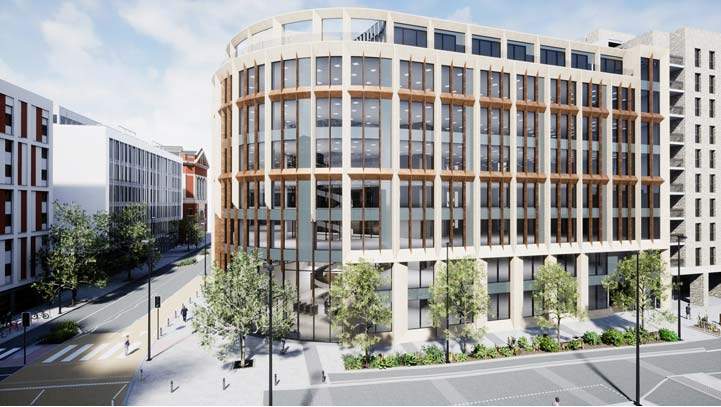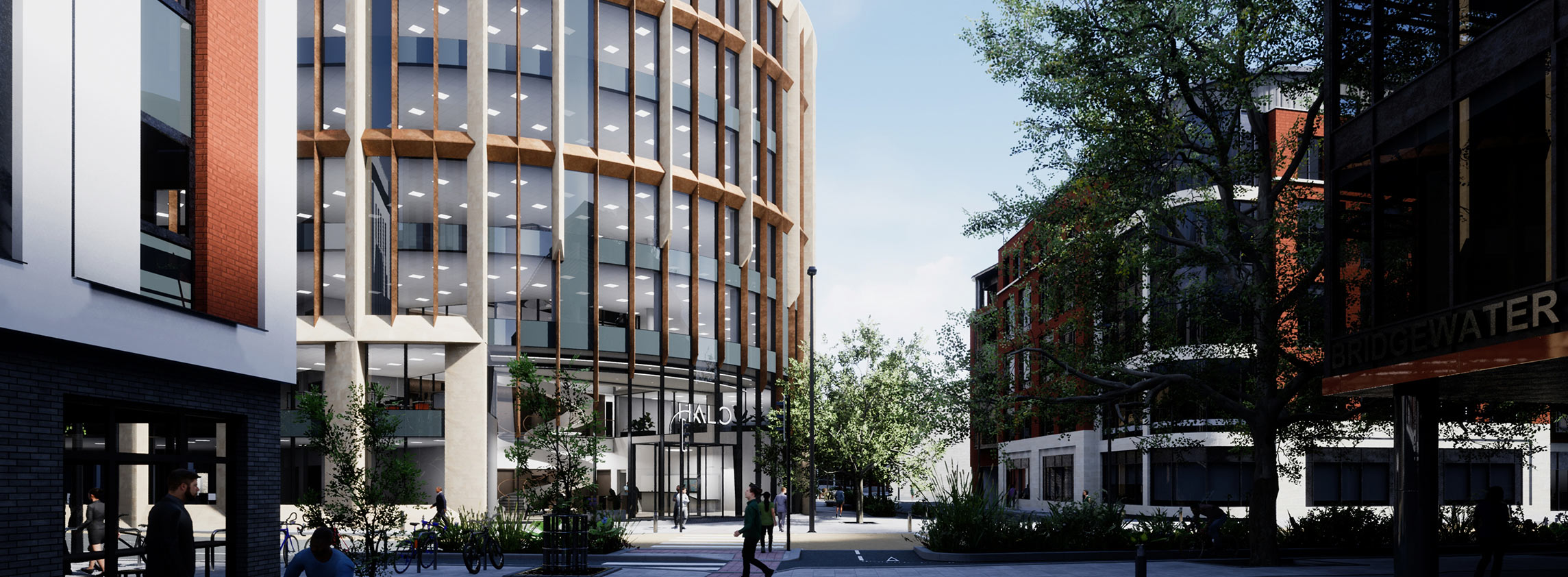The Covid-19 lockdown caused significant disruption during the second quarter. However, this was counterbalanced by the strength of Q1
THE 'GOOD' OFFICE IS HERE TO STAY
Occupiers' preference for high-quality space is rising, since 2016 Grade A space has accounted for an average of 38% of Bristol’s city centre take-up, during the five-year period prior to this Grade A space accounted for an average of 26%. Occupiers know that a successful way to attract and retain talent is to have a high-quality office in a desirable location, that offers convenience through local amenities and on-site facilities.
The Covid-19 pandemic has made occupiers' need for high-quality office space even more prevalent. Large floor plates are required to successfully implement social distancing, on-site shower facilities allow employees to easily cycle or run into work and an on-site canteen reduces employees need to visit potentially busy public areas.
Savills predicts that over the next year Bristol will see a continuation in office refurbishments in the Grade B and C markets as landlords make adjustments to safely support office working and encourage lettings.
The Savills Office FiT survey addressed the impacts of Covid-19, how it has changed our thinking and accelerated the evolution of the office for both occupiers and owners. The results of the survey showed that while there are positives to working from home during the current pandemic, there are many important factors that can’t be facilitated through home working.
High-density open-plan workspaces will need to be rethought and reconfigured to allow for agile working, while amenities remain important as ever for the workforce.
Activities such as meeting and collaborating are best met in the office, design must therefore change to successfully facilitate all of these things under one roof.
Occupational overview

Halo, Finzels Reach, Bristol, was purchased by Tesco Pension Fund during Q2. Savills acted on behalf of the purchaser. Halo is currently under construction and has 42,100 sq ft of office space available
Take-up in Bristol city centre started the year exceptionally well, with total Q1 take-up reaching 219,491 sq ft, a 278% increase on Q1 2019 and 41% up on the five-year quarterly average. However, throughout the second quarter, the full effects of the UK-wide Covid-19 lockdown were felt on office markets across the whole of the UK, with Bristol being no exception.
During the second quarter, Bristol's take-up slowed significantly, ending Q2 with just 52,934 sq ft transacted across nine deals. However, due to the strength of Q1, H1 take-up totalled an impressive 272,425 sq ft, a 16% increase on the same period last year, and 2% up on the ten-year H1 average.
The Professional Services sector accounted for the majority of take-up (35%) with the sector signing for 94,622 sq ft of office space in Bristol city centre. Osborne Clarke agreed to take 74,062 sq ft of Grade A space at new development Halo. Halo is currently under construction and due to complete in the first quarter of 2022. Upon its completion, it will be one of the greenest office buildings in the UK.
During Q2, Savills acted on behalf of Imperial Tobacco securing the largest deal of the quarter
Savills Research
Other key deals to this sector included Ashfords who signed for 13,613 sq ft at Tower Wharf and Freeths who took 4,479 sq ft at 101 Victoria Street. Significant activity also came from the Insurance & Financial Services and the Public Services, Education & Health sectors, which accounted for 18% and 14% of take-up respectively.
During Q2, Savills acted on behalf of Imperial Tobacco securing the largest deal of the quarter, with the Secretary of State signing for 21,506 sq ft at 123 Winterstoke Road.
Office availability in Bristol city centre remains extremely low with just 541,846 sq ft available, and of that, just 118,788 sq ft is Grade A. There is a further 42,112 sq ft available at new development Halo, which will provide a much-needed boost to availability levels upon its completion in 2022. However, due to the significant demand in Bristol's office market and the development already being 64% let to Osborne Clarke, it is likely to be fully let before it reaches completion.
Prime rent in Bristol is currently £37.50 per sq ft. Although disruption from Covid-19 may put downward pressure on office rents in some parts of the UK, Savills predicts that the limited supply in Bristol’s market will see prime rents remain at £37.50 per sq ft until the end of the year and then increase to during 2021.
Investment overview
So far this year, Bristol saw total commercial investment of £171 million, the majority of this was for offices (43%) which totalled £73 million. Although the Covid-19 pandemic has brought significant disruption to occupational and investment markets throughout the UK, in Bristol, office investment volumes were 58% up on the same period last year.
In June, Savills acted on behalf of Tesco Pension Fund purchasing Halo, Finzels Reach, for £69.4 million, this was not only significant for Bristol but was the largest ‘big six’ office investment deal so far this year. This was made even more significant as it completed during a time when offices across the UK were closed. The completion of this deal demonstrates the strength of demand for prime offices within Bristol, which has remained robust even during this period of uncertainty, albeit slightly restricted.
It is expected that once activity returns to the occupational market, the investment market will follow, albeit slightly delayed. However, it is likely that total 2020 investment volume in Bristol will be below the annual average volume.
This is, however, more due to supply than a direct result of Covid-19. Bristol offices remain a strong and sought-after investment, therefore, there is a significant lack of supply as owners do not want to sell.
Prime office yields in Bristol are currently 5% having shifted outward 25 basis points due to sentiment surrounding the Covid-19 pandemic.
Outlook
The growth of Bristol's start-up scene continues
In June, 'StartupBlink' named Bristol as the best UK city outside of London for start-ups. Bristol moved up 57 places since last year’s report, overtaking Manchester and is now 68th place in the global ranking. A further victory was won for Bristol’s start-up scene as SETsquared, the University of Bristol-led start-up incubator, was awarded ‘hottest accelerator’ in Europe at The Europas 2020 in recognition of the work it has done to support over 250 start-ups.
In June, 'startupBlink' named Bristol as the best UK city outside of London for start-ups
Savills Research
This is unsurprising as Bristol is well known as a thriving tech cluster, and during 2019 tech start-ups Graphcore, Five AI and Ultrahaptics all expanded their office space, demonstrating significant employment growth within each firm.
Graphcore signed for an extra circa 6,000 sq ft at the Prudential Buildings where they already occupied circa 9,000 sq ft since 2018. Ultrahaptics signed for an additional 7,000 sq ft at 1 Glass Wharf which has been their base since 2016, originally occupying 14,000 sq ft. Five AI signed for an additional 2,000 sq ft at Temple Studios, where they have been based since 2016. All three companies have been recognised as ‘start-ups to watch’, and their expanding office space demonstrates their significant growth.
Momentum from start-ups has continued during the first half of 2020. During the first quarter, fintech start-up ClearBank signed for 4,000 sq ft at Prologue Works, their first office letting in Bristol. ClearBank was founded in 2017 and is headquartered in the city of London.
Last year, ClearBank raised an estimated £35 million in venture funding and was also named as BusinessCloud’s UK 'number 1 FinTech Disruptor’. Throughout 2019, ClearBank saw employment growth of 74%, further demonstrating the significant growth of the start-up.
While many smaller and start-up companies are at risk due to Covid-19, the UK government has set up schemes to help tech start-ups survive the pandemic. In April a £500 million Future Fund was made available for tech start-ups, this fund matches any backing given to start-ups by the private sector, with state-backed loans of between £125,000 and £5 million available. The national innovation agency, Innovate UK, has also provided a further £750 million through grants and loans for small businesses focusing on research and development.
Many start-up companies begin in serviced office space before they expand and take on traditional office leases. Disruption caused by the Covid-19 pandemic has seen many occupiers in Bristol, who are currently in serviced space, put their moves on hold.
Savills, therefore, expects to see more occupational activity from Bristol’s start-ups towards the end of this year, when disruption has reduced and more certainty is brought back into the market.
